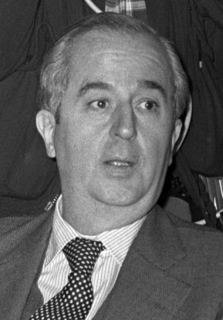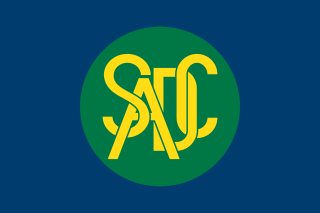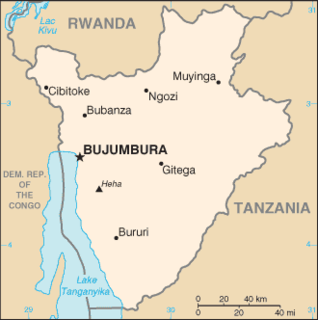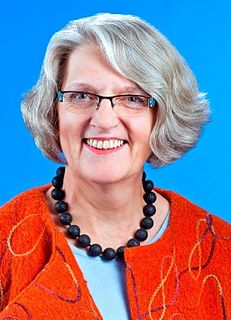A trade union, often simply called a union, is an organization of workers who have come together to achieve many common goals, such as protecting the integrity of their trade, improving safety standards, and attaining better wages, benefits, and working conditions through the increased bargaining power wielded by the creation of a monopoly of the workers. Trade unions typically fund the formal organization, head office, and legal team functions of the trade union through regular fees or union dues. The delegate staff of the trade union representation in the workforce are made up of workplace volunteers who are appointed by members in democratic elections.

Rwanda, officially the Republic of Rwanda, is a landlocked country in the Great Rift Valley where the African Great Lakes region and East Africa converge. One of the smallest countries on the African mainland, its capital city is Kigali. Located a few degrees south of the Equator, Rwanda is bordered by Uganda, Tanzania, Burundi, and the Democratic Republic of the Congo. It is highly elevated, giving it the soubriquet "land of thousand hills", with its geography dominated by mountains in the west and savanna to the east, with numerous lakes throughout the country. The climate is temperate to subtropical, with two rainy seasons and two dry seasons each year. Rwanda has a population of over 12.6 million living on 26,338 km2 of land, and is the most densely populated mainland African country.

The Politics of Rwanda reflect Belgian and German civil law systems and customary law takes place in a framework of a semi-presidential republic, whereby the President of Rwanda is the head of state with significant executive power, with the Prime Minister of Rwanda being the constitutional head of government.

The economy of Rwanda has undergone rapid industrialisation due to a successful governmental policy. Since the early-2000s, Rwanda has witnessed an economic boom improving the living standards of many Rwandans. The Government's progressive visions have been the catalyst for the fast transforming economy. The President of Rwanda, Paul Kagame, has noted his ambition to make Rwanda the "Singapore of Africa".

Rwanda has been the center of much international attention since the war and genocide of 1994. The country is an active member of the United Nations, having presided over the Security Council during part of 1995 and again in 2013–2014. The UN assistance mission in Rwanda, a UN Chapter 6 peace-keeping operation, involved personnel from more than a dozen countries. Most of the UN development and humanitarian agencies have had a large presence in Rwanda.

Zaire, officially the Republic of Zaire, was the name of a sovereign state between 1971 and 1997 in Central Africa that is now known as the Democratic Republic of the Congo. It was, by area, the largest country in sub-Saharan Africa, the third-largest in all of Africa, and the 11th-largest in the world. With a population of over 23 million inhabitants, Zaïre was the most-populous officially Francophone country in the world, as well as one of the most populous in Africa, and one of the most populous countries in the world.
Human occupation of Rwanda is thought to have begun shortly after the last ice age. By the 16th century, the inhabitants had organized into a number of kingdoms. In the 19th century, Mwami (king) Rwabugiri of the Kingdom of Rwanda conducted a decades-long process of military conquest and administrative consolidation that resulted in the kingdom coming to control most of what is now Rwanda. The colonial powers, Germany and Belgium, allied with the Rwandan court.
A national trade union center is a federation or confederation of trade unions in a single country. Nearly every country in the world has a national trade union center, and many have more than one. When there is more than one national center, it is often because of ideological differences—in some cases long-standing historic differences. In some regions, such as the Nordic countries, different centers exist on a sectoral basis, for example for blue collar workers and professionals.

Paul Kagame is a Rwandan politician and former military leader. He is the 6th and current president of Rwanda, having taken office in 2000 when his predecessor, Pasteur Bizimungu, was dismissed and arrested. Kagame previously commanded the Rwandan Patriotic Front, the Uganda-based rebel force that invaded Rwanda and was one of the parties of the conflict during the Rwandan genocide. He was considered Rwanda's de facto leader when he served as Vice President and Minister of Defence from 1994 to 2000. He was re-elected in August 2017 with an official result of nearly 99% in an election criticized for numerous irregularities. He has been described as the "most impressive" and "among the most repressive" African leaders.

Édouard Balladur is a French politician who served as Prime Minister of France under François Mitterrand from 29 March 1993 to 10 May 1995. He unsuccessfully ran for president in the 1995 French presidential election, coming in third place. At age 91, Balladur is currently the oldest living former French Prime Minister.

The Southern African Development Community (SADC) is an inter-governmental organization headquartered in Gaborone, Botswana. Its goal is to further socio-economic cooperation and integration as well as political and security cooperation among 16 southern African countries.

The Rwandan Patriotic Front is the ruling political party in Rwanda. Led by President Paul Kagame, the party has governed the country since its armed wing defeated government forces, winning the Rwandan Civil War in 1994.

The East African Community (EAC) is an intergovernmental organisation composed of six countries in the African Great Lakes region in eastern Africa: Burundi, Kenya, Rwanda, South Sudan, Tanzania, and Uganda. Paul Kagame, the president of Rwanda, is the EAC's chairman. The organisation was founded in 1967, collapsed in 1977, and was revived on 7 July 2000. In 2008, after negotiations with the Southern African Development Community (SADC) and the Common Market for Eastern and Southern Africa (COMESA), the EAC agreed to an expanded free trade area including the member states of all three organizations. The EAC is an integral part of the African Economic Community. The capital of the EAC is Arusha, while the most populous city is Dar es Salaam, both of which are in Tanzania.

The Federation of Green Parties of Africa is an umbrella body of the various national Green parties and environmental parties in Africa. The formal coalition, the African Greens Federation (AGF) formed in 2010 at a conference in Kampala, Uganda. As part of the Global Greens, founded in 2001 in Canberra, Australia, the parties included in the Federation of Green Parties of Africa follow the Global Greens Charter. The organization's permanent administration is in Ouagadougou, the capital of Burkina Faso, where the predominant green organization is the Rassemblement Des Ecologistes du Burkina Faso. These parties tend to, but not always, be left-leaning and often do not have widespread support in their respective countries.

Butare, also known as Huye, is a city in the Southern Province of Rwanda and the capital of Huye district.

The Economic Community of Central African States is an Economic Community of the African Union for promotion of regional economic co-operation in Central Africa. It "aims to achieve collective autonomy, raise the standard of living of its populations and maintain economic stability through harmonious cooperation".
The Rwandese National Union was a conservative, pro-monarchy political party in Rwanda.

On 18–19 October 1965, a group of ethnic Hutu officers from the Burundian military attempted to overthrow Burundi's government in a coup d'état. The rebels were angry about the apparent favouring of ethnic Tutsi minority by Burundi's monarchy after a period of escalating ethnic tension following national independence from Belgium in 1962. Although the Prime Minister was shot and wounded, the coup failed and soon provoked a backlash against Hutu in which thousands of people, including the participants in the coup, were killed. The coup also facilitated a militant Tutsi backlash against the moderate Tutsi monarchy resulting in two further coups which culminated in the abolition of Burundi's historic monarchy in November 1966 and the rise of Michel Micombero as dictator.

Gabriele "Gabi" Weber has been a member of parliament in the German Bundestag for the centre-left SPD since 2013.














